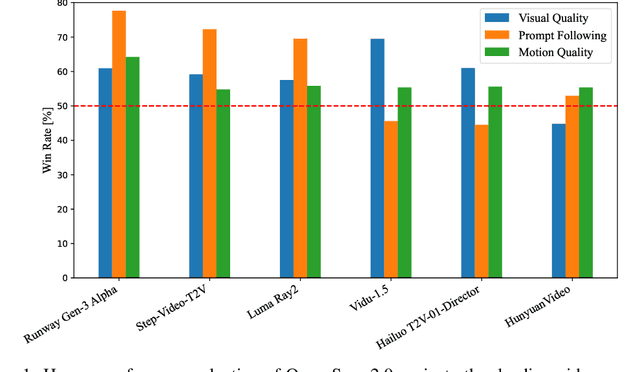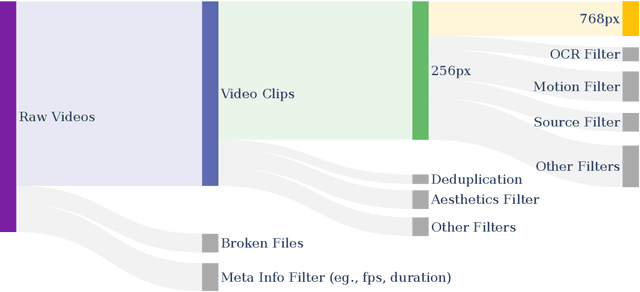Xiang Lian
Open-Sora 2.0: Training a Commercial-Level Video Generation Model in $200k
Mar 12, 2025



Abstract:Video generation models have achieved remarkable progress in the past year. The quality of AI video continues to improve, but at the cost of larger model size, increased data quantity, and greater demand for training compute. In this report, we present Open-Sora 2.0, a commercial-level video generation model trained for only $200k. With this model, we demonstrate that the cost of training a top-performing video generation model is highly controllable. We detail all techniques that contribute to this efficiency breakthrough, including data curation, model architecture, training strategy, and system optimization. According to human evaluation results and VBench scores, Open-Sora 2.0 is comparable to global leading video generation models including the open-source HunyuanVideo and the closed-source Runway Gen-3 Alpha. By making Open-Sora 2.0 fully open-source, we aim to democratize access to advanced video generation technology, fostering broader innovation and creativity in content creation. All resources are publicly available at: https://github.com/hpcaitech/Open-Sora.
FitLight: Federated Imitation Learning for Plug-and-Play Autonomous Traffic Signal Control
Feb 17, 2025Abstract:Although Reinforcement Learning (RL)-based Traffic Signal Control (TSC) methods have been extensively studied, their practical applications still raise some serious issues such as high learning cost and poor generalizability. This is because the ``trial-and-error'' training style makes RL agents extremely dependent on the specific traffic environment, which also requires a long convergence time. To address these issues, we propose a novel Federated Imitation Learning (FIL)-based framework for multi-intersection TSC, named FitLight, which allows RL agents to plug-and-play for any traffic environment without additional pre-training cost. Unlike existing imitation learning approaches that rely on pre-training RL agents with demonstrations, FitLight allows real-time imitation learning and seamless transition to reinforcement learning. Due to our proposed knowledge-sharing mechanism and novel hybrid pressure-based agent design, RL agents can quickly find a best control policy with only a few episodes. Moreover, for resource-constrained TSC scenarios, FitLight supports model pruning and heterogeneous model aggregation, such that RL agents can work on a micro-controller with merely 16{\it KB} RAM and 32{\it KB} ROM. Extensive experiments demonstrate that, compared to state-of-the-art methods, FitLight not only provides a superior starting point but also converges to a better final solution on both real-world and synthetic datasets, even under extreme resource limitations.
Learning-Based Data Storage [Vision] (Technical Report)
Jun 12, 2022![Figure 1 for Learning-Based Data Storage [Vision] (Technical Report)](/_next/image?url=https%3A%2F%2Fai2-s2-public.s3.amazonaws.com%2Ffigures%2F2017-08-08%2F7ebaa9fb3bbf7d6896257878b95e2df3e574d62d%2F2-Figure1-1.png&w=640&q=75)
![Figure 2 for Learning-Based Data Storage [Vision] (Technical Report)](/_next/image?url=https%3A%2F%2Fai2-s2-public.s3.amazonaws.com%2Ffigures%2F2017-08-08%2F7ebaa9fb3bbf7d6896257878b95e2df3e574d62d%2F3-Table1-1.png&w=640&q=75)
![Figure 3 for Learning-Based Data Storage [Vision] (Technical Report)](/_next/image?url=https%3A%2F%2Fai2-s2-public.s3.amazonaws.com%2Ffigures%2F2017-08-08%2F7ebaa9fb3bbf7d6896257878b95e2df3e574d62d%2F3-Figure2-1.png&w=640&q=75)
![Figure 4 for Learning-Based Data Storage [Vision] (Technical Report)](/_next/image?url=https%3A%2F%2Fai2-s2-public.s3.amazonaws.com%2Ffigures%2F2017-08-08%2F7ebaa9fb3bbf7d6896257878b95e2df3e574d62d%2F3-Figure3-1.png&w=640&q=75)
Abstract:Deep neural network (DNN) and its variants have been extensively used for a wide spectrum of real applications such as image classification, face/speech recognition, fraud detection, and so on. In addition to many important machine learning tasks, as artificial networks emulating the way brain cells function, DNNs also show the capability of storing non-linear relationships between input and output data, which exhibits the potential of storing data via DNNs. We envision a new paradigm of data storage, "DNN-as-a-Database", where data are encoded in well-trained machine learning models. Compared with conventional data storage that directly records data in raw formats, learning-based structures (e.g., DNN) can implicitly encode data pairs of inputs and outputs and compute/materialize actual output data of different resolutions only if input data are provided. This new paradigm can greatly enhance the data security by allowing flexible data privacy settings on different levels, achieve low space consumption and fast computation with the acceleration of new hardware (e.g., Diffractive Neural Network and AI chips), and can be generalized to distributed DNN-based storage/computing. In this paper, we propose this novel concept of learning-based data storage, which utilizes a learning structure called learning-based memory unit (LMU), to store, organize, and retrieve data. As a case study, we use DNNs as the engine in the LMU, and study the data capacity and accuracy of the DNN-based data storage. Our preliminary experimental results show the feasibility of the learning-based data storage by achieving high (100%) accuracy of the DNN storage. We explore and design effective solutions to utilize the DNN-based data storage to manage and query relational tables. We discuss how to generalize our solutions to other data types (e.g., graphs) and environments such as distributed DNN storage/computing.
 Add to Chrome
Add to Chrome Add to Firefox
Add to Firefox Add to Edge
Add to Edge